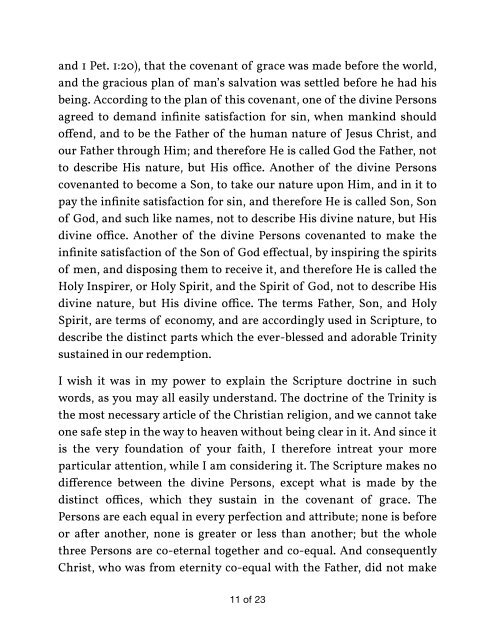The Self-Existence of Jesus Christ
William Romaine (1714-1795), was An influential and much-loved British preacher and lecturer in theology who held strong views on the deity and eternal self-existence of the Lord Jesus. He played a big part in the evangelical revival in England. On his death John Newton said of him that he was “inflexible as an iron pillar in publishing the truth, and unmoved either by the smiles or frowns of the world.”
William Romaine (1714-1795), was An influential and much-loved British preacher and lecturer in theology who held strong views on the deity and eternal self-existence of the Lord Jesus. He played a big part in the evangelical revival in England. On his death John Newton said of him that he was “inflexible as an iron pillar in publishing the truth, and unmoved either by the smiles or frowns of the world.”
You also want an ePaper? Increase the reach of your titles
YUMPU automatically turns print PDFs into web optimized ePapers that Google loves.
and 1 Pet. 1:20), that the covenant <strong>of</strong> grace was made before the world,<br />
and the gracious plan <strong>of</strong> man’s salvation was settled before he had his<br />
being. According to the plan <strong>of</strong> this covenant, one <strong>of</strong> the divine Persons<br />
agreed to demand infinite satisfaction for sin, when mankind should<br />
<strong>of</strong>fend, and to be the Father <strong>of</strong> the human nature <strong>of</strong> <strong>Jesus</strong> <strong>Christ</strong>, and<br />
our Father through Him; and therefore He is called God the Father, not<br />
to describe His nature, but His <strong>of</strong>fice. Another <strong>of</strong> the divine Persons<br />
covenanted to become a Son, to take our nature upon Him, and in it to<br />
pay the infinite satisfaction for sin, and therefore He is called Son, Son<br />
<strong>of</strong> God, and such like names, not to describe His divine nature, but His<br />
divine <strong>of</strong>fice. Another <strong>of</strong> the divine Persons covenanted to make the<br />
infinite satisfaction <strong>of</strong> the Son <strong>of</strong> God effectual, by inspiring the spirits<br />
<strong>of</strong> men, and disposing them to receive it, and therefore He is called the<br />
Holy Inspirer, or Holy Spirit, and the Spirit <strong>of</strong> God, not to describe His<br />
divine nature, but His divine <strong>of</strong>fice. <strong>The</strong> terms Father, Son, and Holy<br />
Spirit, are terms <strong>of</strong> economy, and are accordingly used in Scripture, to<br />
describe the distinct parts which the ever-blessed and adorable Trinity<br />
sustained in our redemption.<br />
I wish it was in my power to explain the Scripture doctrine in such<br />
words, as you may all easily understand. <strong>The</strong> doctrine <strong>of</strong> the Trinity is<br />
the most necessary article <strong>of</strong> the <strong>Christ</strong>ian religion, and we cannot take<br />
one safe step in the way to heaven without being clear in it. And since it<br />
is the very foundation <strong>of</strong> your faith, I therefore intreat your more<br />
particular attention, while I am considering it. <strong>The</strong> Scripture makes no<br />
difference between the divine Persons, except what is made by the<br />
distinct <strong>of</strong>fices, which they sustain in the covenant <strong>of</strong> grace. <strong>The</strong><br />
Persons are each equal in every perfection and attribute; none is before<br />
or after another, none is greater or less than another; but the whole<br />
three Persons are co-eternal together and co-equal. And consequently<br />
<strong>Christ</strong>, who was from eternity co-equal with the Father, did not make<br />
11 <strong>of</strong> 23

















